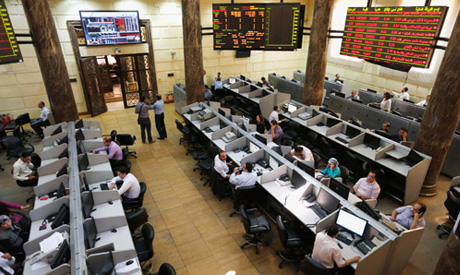
File Photo: Traders work at the Egyptian stock exchange in Cairo (Photo: Reuters)
Parliament approved Egypt’s first-ever bankruptcy law in a move to encourage more local and foreign investment last week, ending the automatic prosecution of debtors and allowing them to file for bankruptcy and for businesses to stay open while negotiating debt repayments.
Before the new law was passed, bankruptcy cases were treated by the courts on a case-by-case basis and in the absence of a specific law on insolvency. Debtors can now file for bankruptcy instead of facing prosecution under the new law, which also allows company debts to be repaid through restructuring rather than liquidation.
The law is part of government efforts to enhance the investment environment by eliminating obstacles that could dissuade local and foreign investors. A new investment law was issued in May last year with the same purpose.
The new bankruptcy law was initially approved in January 2017 by the cabinet, before being approved last week by parliament. It is part of reform measures being taken to help an ailing economy that has struggled with years of crisis following the 25 January Revolution.
Calls for a new bankruptcy law increased following the November 2016 devaluation of the Egyptian pound, which has affected many investors and businessmen who saw their debts in US dollars almost double in value, in some cases making it impossible for them to keep up with debt repayments.
“The sometimes huge losses suffered by investors and businessmen has resulted in some of them nearing insolvency,” said Sherif Al-Gebali, head of the chamber of chemical industries at the Federation of Egyptian Industries.
Companies that wanted to pay for imported supplies and equipment shipped before the pound’s devaluation suffered from repayment costs when the exchange rate with the dollar jumped from LE8.8 to approximately LE18.
Al-Gebali said the new law would help debtors avoid penalties like imprisonment, which was a deterrent to possible investors.
The law gives debtors the right to ask the courts to approve a restructuring plan in cases of heavy indebtedness, allowing companies to raise capital even during the indebted period. It stipulates that the restructuring period should take place within 60 days of submitting a request, while giving the judge the right to extend that period.
Liquidating struggling companies can now take nine months under the new law, instead of the more than two years that was common beforehand.
When foreign investors consider entering the Egyptian market, Al-Gebali said, they usually assess their ability to exit without encountering problems. “This is a crucial point in encouraging more foreign investment in Egypt,” he said.
Egypt ranked 115th among 190 countries in the World Bank’s Resolving Insolvency Index in its 2018 Doing Business Report. The report said that creditors in Egypt recover an average of 26 cents for every dollar lent, compared to 71.2 cents in countries that are members of the Organisation for Economic Cooperation and Development (OECD).
Struggling companies in Egypt may lose around 22 per cent of their assets, compared to 9.1 per cent in advanced economies. Bankruptcy proceedings can take an average of 2.5 years, compared to 1.7 years in OECD countries.
The law is important for both Egyptian and foreign investors, Samir Aref, head of the 10 Ramadan Investors Association, said. “Both have suffered because of the absence of a bankruptcy law,” he added.
Aref said that there were some 4,000 struggling factories in Egypt and that the new law would help many of them to overcome their insolvency worries.
“The law will attract many new foreign investments, which in turn will increase Egypt’s exports,” he said, adding that it was important for Egyptian investors to feel secure in order for this to encourage foreign investors to enter the Egyptian market.
*This story was first published in Al-Ahram Weekly newspaper
Short link: